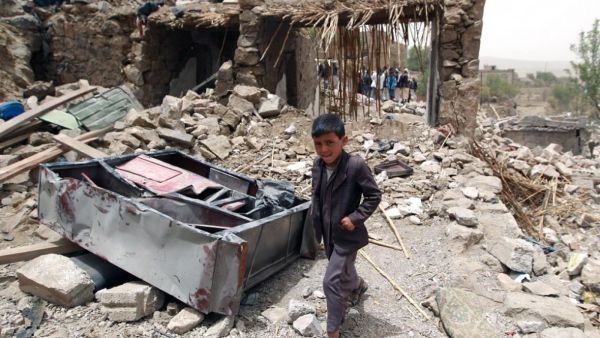Hans Grundberg is the fourth appointed United Nations envoy to try to put an end to the Yemeni conflict still boiling after seven years of deadly war.
Everyone at the UN Security Council has high hopes that the Swedish diplomat might just pull it off and silence the guns and the missiles and allow the warplanes to taxi in their military bases in Saudi Arabia.
The @UN_Spokesperson announced today the appointment of Hans Grundberg of Sweden, as the UN Special Envoy for #Yemen, who brings over 15 years of experience in conflict resolution, negotiation, mediation, with a focus on the Middle East https://t.co/qncgx4EAdP pic.twitter.com/QBSJCehRVf
— @OSE_Yemen (@OSE_Yemen) August 6, 2021
Grundberg is an experienced diplomat who worked for more than 15 years in conflict resolution in the Middle East, serving as the EU Ambassador to Yemen since 2019 and before that he held posts in Cairo and Jerusalem and in 2009 worked on the EU Gulf Working Group in Brussels.
Thus he comes to Yemen with a heavy baggage particularly because, also, he helped the warring parties sign the Stockholm Agreement and defuse the fighting in the Port of Hodeideh in late 2018. As a diplomat, he is well equipped for the new job as a UN envoy.
But with Yemen it’s tough because of the many sides to the reeling conflict that plummeted further when the Saudis entered a war in 2015 to unseat the Houthis who took over the country the previous year and restore the recognized government of Abed Rabboh Mansour Hadi and whose effective abode is now in Riyadh.
Can The New UN Hans Grundberg Bring Peace to Yemen? https://t.co/RbQx1rtjnL
— Marwan Asmar (@Asmar1959) August 8, 2021
But this is easier said than done. The war on Yemen and inside the country turned bloody, messy and violent. The surgical strikes made from the skies frequent missed their targets, sometimes hitting school bases, wedding gatherings and all the rest of it. The Houthi militias also gave as good as they got, frequently targeting their missiles and drones on bases, locations, oil facilities and cities and towns inside Saudi Arabia, sometimes reaching as far as Riyadh.
Two things are coming out from the continuing war: Deadly violence as well as famine and starvation. United Nations figures estimate the war caused 233,000 deaths including 131,000 from lack of food, bad health services and infrastructure. The war caused tens of thousands of civilian casualties as well as 5,660 in the first five years of the conflict alone. In the first nine months of 2020 as well, there was 1,500 civilian casualties including men, women, young and old.
This gift will dramatically help @WFP reduce suffering from hunger in #Yemen. Thank you, @USAID + @USAIDSavesLives! https://t.co/48CLapRHIx
— Steve Taravella (@SteveTaravella) August 9, 2021
The UN Secretary-General Antonio Gueterres said Yemen is on the edge of the “worst famine the world has seen for decades”. Henruetta Fore, head of UNICEF points out an “imminent catastrophe” is about to happen in the country. This war is the worst humanitarian crisis.
Yemen’s population stands just over 29 million but over two-thirds of the people are dependent on outside aid to survive according to the UN, and the international organization further suggests that 16 million Yemenis will shortly experience hunger and that about 400,000 children may starve to death.
This is the kind of devastating issues Grundberg would be dealing with as part of his mission to get the different sides together as appointed from the UN Secretary-General and the Security Council who are desperately seeking to establish a ceasefire. Yemen has become a source of financial drainage for the UN.
It is reported that the World Food Program needs $1.9 billion dollars to run its operations in the country in 2021 but it is short of that by $900 million, and it has to look for parched-ridden donors.
"The #UnitedNations, which considers #Yemen the largest #HumanitarianCrisis in the world, reports 16.2 million people are extremely short of #food and #suffering from acute #hunger"@BaheyHassan @SaeedKD7 @MubashirAKhalid #yemen #poverty #food #hungerhttps://t.co/62XhqZebdP
— Center For Security, Race and Rights (@RUCSRR) August 7, 2021
He, as a diplomat and conflict-resolution expert, must play it carefully, with diligence and an enormous amount of tact and diplomacy and of course, time, given the somewhat cool and uneventful track record of the UN peace-negotiating role in Yemen.
Grundberg was preceded by the quietly-spoken Martin Griffths, a British diplomat who took over the job in 2019 from Ismael Ould Sheikh Ahmad, a Mauritanian diplomat who had been in the job since 2015 and before it was the Moroccan Jamal Benomar who started the UN envoy role in 2011, just at the time of the Arab Spring when popular revolts struck the Arab world.
In #Tigray, where over 90% of the population requires life-saving assistance, most health centres are not functional and all equipment and medicines need to be replaced - @UNReliefChief Martin Griffiths noted during his recent visit.https://t.co/Sbvuflk4Yk
— World Health Organization (WHO) (@WHO) August 5, 2021
None of the diplomats, except Griffiths succeeded in pushing forward a negotiated agenda. Before the Briton, the warring sides were not talking but when he came onto the scene, and through diplomatic patience, and trotting from one capital to another, he managed to get a UN initiative going and bring the warring sides together, the Houthis, Saudis, Kuwaitis and Iranians together to try and reach some king of an agreement to stop the war.
There was a diplomatic breakthrough, as evidence by the Stockholm accord but somehow, it didn’t materialize into a general ceasefire on a nationwide country level. And in the end, Griffiths submitted his resignation to be followed by the latest Swedish diplomat who has a lot of experience but we are yet to see his deft operating skills.
The #Stockholm accord on #Yemen is a promising start. Despite/because of #Senate res on #SaudiArabia & @JKhashoggi, what can USG do to advance peace process? Read this smart analysis from my new @WashInstitute colleague @dstroul. https://t.co/v01N0oYtJz
— Robert Satloff (@robsatloff) December 13, 2018
But with Yemen, the diktat is time, rugged geographical terrain, its people and divergent politics. While many has welcomed his appointment like US Secretary of State Antony Blinken, the Saudis and even the Houthis, who control part of the country, the latter group has given mixed signals and somewhat harsh at that.
Put blankly some of their leaders have said they will not talk to the new envoy unless the Saudi remove their air and naval blockade imposed against them since 2015. Mohammad Abdul Salam, the Houthi chief negotiator said these are basic conditions that should be met and lifted before any talks on ceasefire negotiations.
Secretary-General of the Gulf Cooperation Council (@GCC) Nayef Al-Hajraf has welcomed the United Nations' decision to appoint the Swedish diplomat Hans Grundberg as the new UN special envoy for #Yemen to succeed Martin Griffiths.
— Saudi Gazette (@Saudi_Gazette) August 7, 2021
https://t.co/EatQ0hxGtr
So, it’s back to square one! Or is it? No doubt, and judging from the past 10 or 11 years, negotiations will continue but hopefully, Grundberg will build on the “partial successes” of Griffiths and achieve a partial breakthrough where all the parties agree to stop fighting.
What many believe is that Yemen continues to dwindle into a pit of chaos, hunger and war. The situation is disastrous with a rescue package required amidst the perpetual bloodbaths. Nobody knows when the war will end and nobody knows when the warring parties will turn their swords in ploughshares. Grundberg will need to muster all his diplomatic skills.







